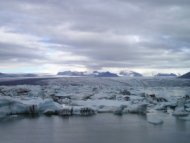Normally, the news that Antarctica's summer melt season is getting longer might just be added to an endless compilation of scientific evidence that confirms the reality of global climate change. A recent research report, though, seems to run counter to the conventional wisdom. It shows that if the ice pack at the bottom of the world has more time to melt each summer, less of it might transition from solid to liquid.
In fact, the study, published in the March issue of Nature Geoscience, found, the presence of a layer of slowly melting freshwater might actually help slow the melting process--as meltwater from Antarctica's ice shelves increases in volume, it creates a cooler surface layer that shields the ocean from warmer, ocean strata below.
The study provides a compelling contrast to findings in the Arctic, where studies from the last 60 years have supported the idea that increased summer melting breaks up ice shelves, leading to a rise in sea level in the region. The maximum-recorded extension for the Arctic's polar ice cap this year, on March 15, was the sixth lowest on record. All ten of the region's lowest maximums have occurred in the past ten years.
But on the opposite side of the globe, sea ice has expanded dramatically in the austral autumn and winter months, achieving a record enlargement as recently as 2010. The scientists behind the study have come up with several theories to explain the southern sea ice expansion. More intense winds might reduce transfer of heat--one theory holds--and then go on to enhance overall cooling. Another surmise: build-up of cold melt water may result from a negative feedback effect in which cooler ocean water protects sea ice from melting, which would, in turn, help offset greenhouse warming.
Using a coupled-climate model simulation called EC-Earth, which models both the atmosphere and oceans, the study's scientists showed that the presence of increased accumulations of cool meltwater promote sea-ice expansion. Starting with the year 2000, the team performed a 31-year sensitivity experiment, adding an additional 250 billion tons of water each year to surface waters around Antarctica.

http://english.ruvr.ru/2013_04_30/Antarctica-ice-increasing-because-of-global-warming-survey/
ReplyDeletehttp://www.nature.com/ngeo/journal/v6/n5/full/ngeo1767.html
ReplyDelete